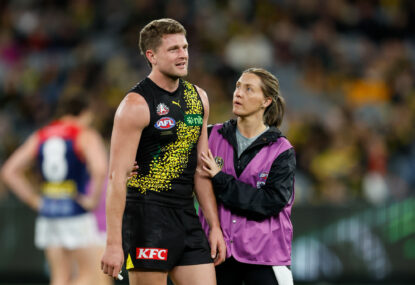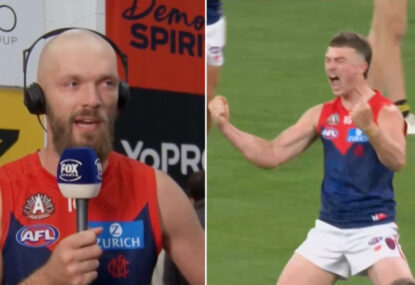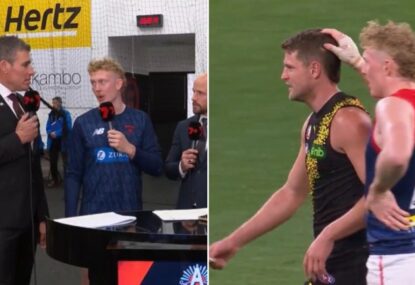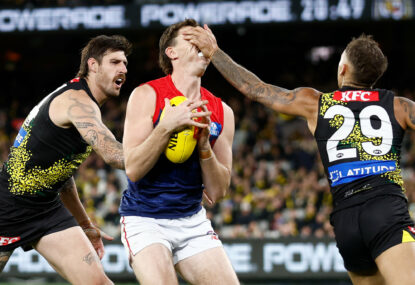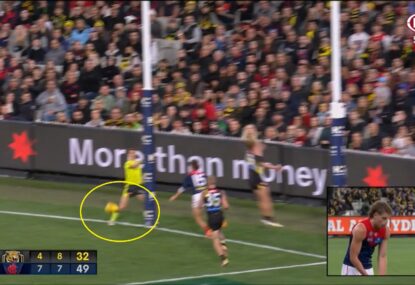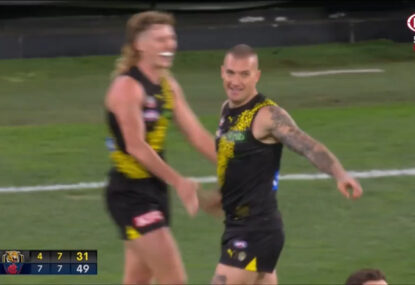This was not how 2019 was supposed to unfold for the Melbourne Football Club.
This time last year the Dees were rejoicing after defeating the West Coast Eagles by 17 points at Optus Stadium in the penultimate round of the 2018 season to break a 12-year finals hoodoo.
Boasting the competition’s best attack, the success-starved club then defeated Geelong and Hawthorn in consecutive sudden-death finals before bowing out in the preliminary final stage in humiliating fashion against the Eagles, losing by 66 points.
They failed to kick a goal in the first half in what was their first preliminary final since 2000, the year in which they last made the grand final.
In the off-season that followed Jesse Hogan requested a trade home to Fremantle following an exciting but at times testing period at the Dees, during which he battled injuries, poor form, a testicular cancer diagnosis and the death of his father.
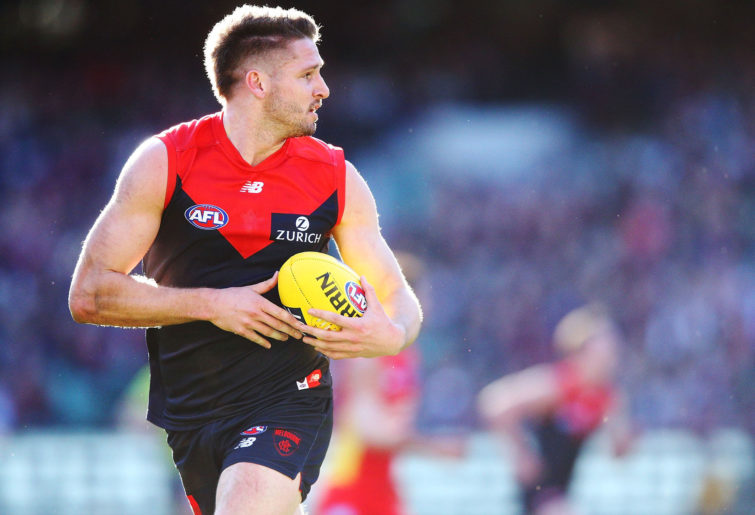
(Michael Dodge/Getty Images)
Midfielder Dom Tyson and forward Dean Kent also left the club in pursuit of further opportunities at North Melbourne and St Kilda respectively.
Into the club came Gold Coast Suns defenders Steven May and Kade Kolodjashnij, who both arrived at Melbourne expecting to experience the team success they failed to attain on the holiday strip.
Thus, entering the new season, many pundits had Melbourne as potential improvers in 2019, some even as a top-four team.
Just prior to the start of proceedings coach Simon Goodwin signed a contract extension, taking his tenure at the club to at least the end of the 2022 season.
But after losing five of their first six matches of the season, including an 80-point loss to Geelong at Kardinia Park in Round 2, many were fearing a return to the bad old days when they used to occupy the lower rungs of the ladder.
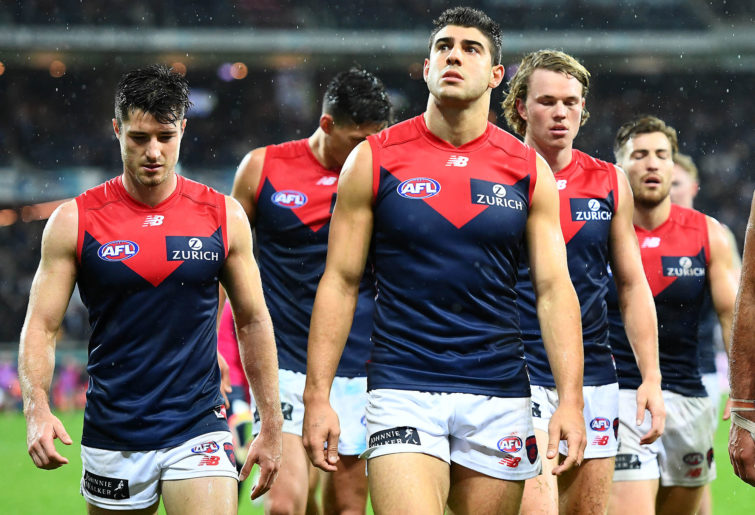
(Quinn Rooney/Getty Images)
Back-to-back wins over Hawthorn (at the MCG) and the Suns (at Metricon Stadium) in Round 7 and eight respectively appeared to restore some hope, before four straight losses saw them tumble back down the ladder and fall away from finals contention.
Just how bad Melbourne’s season has been was highlighted on Friday night when, in front of a crowd of just 23,700 people, the club crashed to a 53-point defeat at the hands of the Sydney Swans, who for weeks have been fielding the youngest team in the competition.
After trailing by just six points at the first change, Simon Goodwin’s men failed to register a major for the next two quarters before pegging back two in the final term when the match was out of reach.
Goodwin said after the match that the loss was “unacceptable” and that it was up to the club to try to pick themselves up for next year.
It was their sixth straight loss and arguably their worst performance this year, and it was also a disappointing way for Jordan Lewis to mark what could be his final appearance at the MCG, with the four-time premiership Hawk expected to retire at season’s end.
Not only have the Dees fallen from the heights of last year, but they’ve also had to contend with a horror injury toll which has seen several players, including star recruit Steven May, spend some time on the sidelines.
Only the Gold Coast Suns and their dismal percentage is keeping the Demons from claiming their first wooden spoon in a decade, but the upside to it is that the club will receive either pick two or, if the Suns get a priority pick, pick three in the upcoming draft.
But if Richmond showed us anything in 2016-17, the horror season the Dees are enduring could be exactly what they need if they are to rocket back up the ladder again in 2020.
After three straight first-week finals exits between 2013 and 2015, the Tigers crashed to 13th place in 2016 and lost its final match of that season by 113 points.
But 12 months later Richmond roared back up the ladder, finishing third and going on to record a hat-trick of convincing finals victories culminating in their 48-point thrashing of the Adelaide Crows on grand final day.
But the Demons need not consider an opposing team’s turnaround, even if it remains fresh in the competition’s memory, as a template for a 2020 comeback; even Melbourne themselves were able to manage a similar recovery two decades ago, going from third-last in 1999 to grand finalists just 12 months later under the coaching of Neale Daniher.
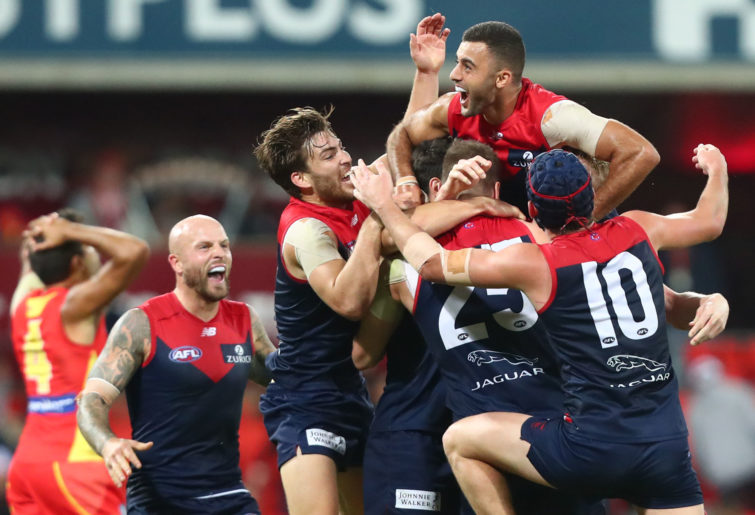
(Chris Hyde/Getty Images)
Before that, they went from wooden spooners in 1997 to preliminary finalists in 1998, while the Brisbane Lions did the same thing the following year and the West Coast Eagles followed suit in 2010 and 2011.
Had they won the grand final against Essendon in 2000, it would’ve set a record for the biggest turnaround in a single season in AFL history.
But before the Dees can even think about that, they still need to play one more game – against North Melbourne in Hobart – to finish what has been a disappointing season, and when the final siren goes, it will signal the start what promises to be a brutal off-season for the club.
While Jordan Lewis is almost certain to retire, question marks will hover over the heads of several other players, most notably Nathan Jones, who will be 33 at the start of next season but will very likely play on with the 300-game milestone well within reach.
In addition to receiving a top-three draft pick, they’ll also receive a much easier draw next season due to finishing second-last, which means they’ll get a maximum of three return matches against their fellow bottom-six clubs.
What is also guaranteed is that, despite their poor season, they’ll get at least one Friday night game next year – the annual Anzac Eve match against Richmond, which will be Melbourne’s home game – but other than that will be expected to be kept off Broadway for the most part.
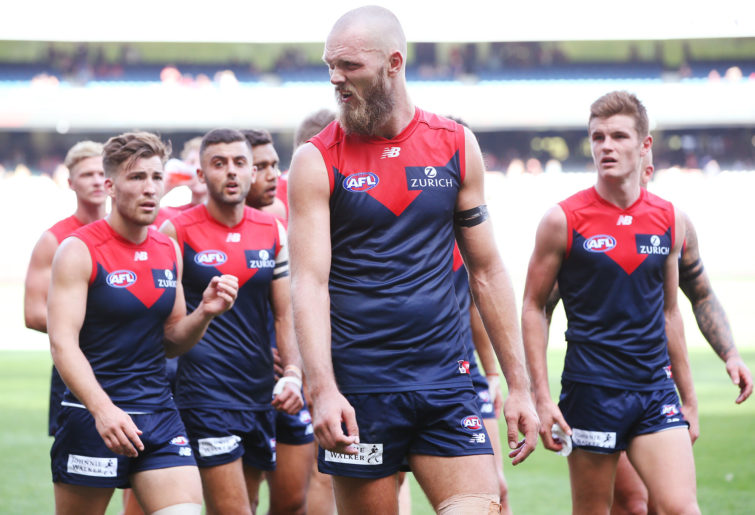
(Michael Dodge/Getty Images)
It also remains to be seen whether the Queen’s Birthday clash will again alternate hosting rights, in which case the Dees would be the home side, or whether Collingwood will retain the hosting rights for another year.
On the flip side, Sydney’s win, which was achieved without the likes of Jarrad McVeigh and Lance Franklin, proved that their future is bright and that their time in the bottom five might be just a brief one after all.
In their absences, the win was masterminded by the young brigade led by Ollie Florent, who recently racked up his 50th AFL game, as well as Nick Blakey, Aliir Aliir and James Rowbottom, players who will be at the club for the most part of the next decade.
With Nick Smith and Heath Grundy having both retired and Kieren Jack also likely to pull up stumps soon, only three survivors from the 2012 premiership team will remain going into 2020: Josh Kennedy, Luke Parker and Sam Reid.
This season will be just the second time since 2002 the men from the Harbour City will be absent from September and the first time since 1994 they have finished in the bottom five.
It will also be the first time coach John Longmire will not be as busy in September as he has been for the past eight years after succeeding Paul Roos as coach at the end of the 2010 season.
But the club has shown that it can bounce back straight away, as evidenced in 2010 when the club topped the ladder after six rounds before eventually settling for a fifth-place finish and then suffering a heartbreaking defeat to the Western Bulldogs in the semi-final.
That came after they finished 12th in 2009, with its percentage below 100 for the first time in 15 years.
And after missing the finals in 2002, during which Rodney Eade was sacked as coach and replaced in the interim by Paul Roos, who would eventually win the full-time gig, the Swans surprised many by reaching the preliminary final in 2003 before losing to the Brisbane Lions.
Thus, there are no limitations as to what the current crop of Swans can achieve in 2020, and after signing a contract extension earlier this year, coach John Longmire will be given more than enough time to mould the playing list into one which he hopes can land the club’s next premiership.

































































































